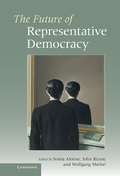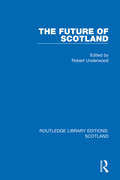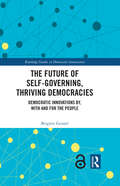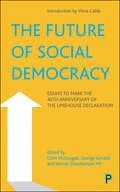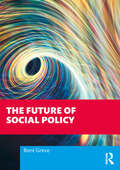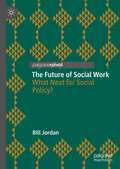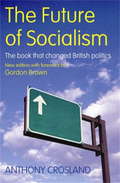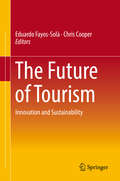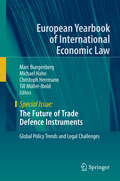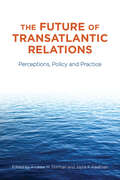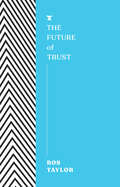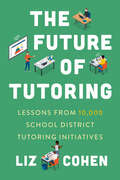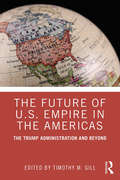- Table View
- List View
The Future of Public Housing
by Mark Stephens Jie Chen Yanyun ManPublic housing was once an important strand in western housing policies, but is seldom seen as a mainstream policy instrument for the future. In contrast, in many East Asian countries large public housing programs are underway. Behind these generalizations, there are exceptions, too. By including perspectives of scholars from across the world, this book provides new insights into public housing in its various forms. It contains in-depth chapters on public housing in five East Asian countries and six Western countries, together with three comparative overview chapters.
The Future of Radioactive Waste Governance: Lessons from Europe (Energiepolitik und Klimaschutz. Energy Policy and Climate Protection)
by Rinie Van Est Maarten ArentsenThis Open Access book examines the radioactive waste management policies of ten European countries: Belgium, Finland, France, Germany, Italy, the Netherlands, Spain, Sweden, Switzerland and the United Kingdom. Most countries are in the process of planning and creating final storage solutions, while none has yet finalized this process. Over the past decades many countries have been renewing their decision-making processes and the institutions that support them. The book provides 16 lessons that may advance the future democratic decision-making process around radioactive waste management.
The Future of Representative Democracy
by John Keane Sonia Alonso Wolfgang MerkelThe Future of Representative Democracy poses important questions about representation, representative democracy and their future. Inspired by the last major investigation of the subject by Hanna Pitkin over four decades ago, this ambitious volume fills a major gap in the literature by examining the future of representative forms of democracy in terms of present-day trends and past theories of representative democracy. Aware of the pressing need for clarifying key concepts and institutional trends, the volume aims to break down barriers among disciplines and to establish an interdisciplinary dialogue among scholars. The contributors emphasise that representative democracy and its future is a subject of pressing scholarly concern and public importance. Paying close attention to the unfinished, two-centuries-old relationship between democracy and representation, this book offers a fresh perspective on current problems and dilemmas of representative democracy and the possible future development of new forms of democratic representation.
The Future of Revolution: Communist Prospects from the Paris Commune to the George Floyd Uprising
by Jasper BernesHow might a twenty-first-century revolution against class society succeed?Communism comes from the future, but its hopes haunt our past. Reading revolutionary history from the Paris Commune to the George Floyd Uprising by the light of communist theory, from Marx to C. L. R. James, The Future of Revolution illuminates the possibilities for overcoming class society in the twenty-first century.When Marx wrote that the Paris Commune of 1871 showed that &“the working class cannot simply lay hold of the ready-made state machinery, and wield it for its own purposes,&” he identified a principle that will remain true as long as capitalism and its class antagonism persist. Historical revolutions reveal essential features of our communist horizon, which would-be revolutionaries, then as now, must negotiate one way or another. In chapters that move from a critical history of the workers&’ council to a reading of Marx&’s theory of value as an inverted description of communism, Jasper Bernes synthesizes from a history of failure the key criteria for success. He defines for our present moment the urgent mission of the world proletariat.
The Future of Scotland (Routledge Library Editions: Scotland #30)
by Robert UnderwoodOriginally published in 1977, at a time when Scottish affairs were in a state of flux as the debate over political devolution and self-government was pursued, this book deals with key features of Scottish development. It explores the main issues which were then being considered in the planning of Scotland’s future. The contributors discuss the issues from a global perspective using Scotland as an occasion for detailed focus.
The Future of Self-Governing, Thriving Democracies: Democratic Innovations By, With and For the People (Routledge Studies in Democratic Innovations)
by Brigitte GeisselThis book offers a new approach for the future of democracy by advocating to give citizens the power to deliberate and to decide how to govern themselves. Innovatively building on and integrating components of representative, deliberative and participatory theories of democracy with empirical findings, the book provides practices and procedures that support communities of all sizes to develop their own visions of democracy. It revitalizes and reinfuses the ‘democratic spirit’ going back to the roots of democracy as an endeavor by, with and for the people, and should inspire us in our search for the democracy we want to live in. This book is of key interest to scholars and students in democracy, democratic innovations, deliberation, civic education and governance and further for policy-makers, civil society groups and activists. It encourages us to reshape democracy based on citizens’ perspectives, aspirations and preferences.
The Future of Social Democracy: Essays to Mark the 40th Anniversary of the Limehouse Declaration
by Colin Mcdougall, George Kendall, Wendy Chamberlain MP2021 marks the 40th anniversary of the Limehouse Declaration and the launch of the Social Democratic Party in the UK, which was later to merge and form the Liberal Democrats. To mark this important milestone, this book brings together prominent politicians from across the spectrum of social democracy to reflect on its history and the challenges it faces in the coming decades. With an introduction by Sir Vince Cable describing the current state of social democracy across the world, leading figures including Sarah Olney, Roger Liddle and Chris Huhne explore a wide range of contentious policy areas such as the economy, housing and globalisation. Together, they set out a vision for the country and for the Liberal Democrats that has social justice at its core.
The Future of Social Movement Research: Dynamics, Mechanisms, and Processes (Social Movements, Protest and Contention)
by Jacquelien Van StekelenburgAre the dynamics of contention changing? This is the question confronted by the contributors of this volume, among the most influential scholars in the field of social movements. The answers, arriving at a time of extraordinary worldwide turmoil, not only provide a wide-ranging and varied understanding of how social movements arise and persist, but also engender unanswered questions, pointing to new theoretical strands and fields of research. The Future of Social Movement Research asks: How are the dynamics of contention shaped by globalization? By societies that are becoming increasingly more individualized and diverse? By the spread of new communication technologies such as social media, cell phones, and the Internet? Why do some movements survive while others dissipate? Do local and global networks differ in nature? The authors&’ essays explore such questions with reference to changes in three domains of contention: the demand of protest (changes in grievances and identities), the supply of protest (changes in organizations and networks), and how these changes affect the dynamics of mobilization. In doing so, they theorize and make empirically insightful how globalization, individualization, and virtualization create new grievances, new venues for action, new action forms, and new structures of contention. The resulting work—brought together through engaging discussions and debates between the contributors—is interdisciplinary and unusually broad in scope, constituting the most comprehensive overview of the dynamics of social movements available today. Contributors: Marije Boekkooi, VU-U, Amsterdam; Pang Ching Bobby Chen, U of California, Merced; Donatella della Porta, European U Institute; Mario Diani, U of Trento, Italy; Jan Willem Duyvendak, U of Amsterdam; Myra Marx Ferree, U of Wisconsin–Madison; Beth Gharrity Gardner; Ashley Gromis; Swen Hutter, U of Munich; Ruud Koopmans, WZB, Berlin; Hanspeter Kriesi, U of Zurich; Nonna Mayer, National Centre for European Studies; Doug McAdam, Stanford U; John D. McCarthy, Pennsylvania State U; Debra Minkoff, Barnard College, Columbia U; Alice Motes; Pamela E. Oliver, U of Wisconsin–Madison; Francesca Polletta, U of California, Irvine; Jacomijne Prins, VU-U, Amsterdam; Patrick Rafail, Tulane U; Christopher Rootes, U of Kent, Canterbury; Dieter Rucht, Free U of Berlin; David A. Snow, U of California, Irvine; Sarah A. Soule, Stanford U; Suzanne Staggenborg, U of Pittsburgh; Sidney Tarrow, Cornell U; Verta Taylor, U of California, Santa Barbara; Marjoka van Doorn; Martijn van Zomeren, U of Groningen; Stefaan Walgrave, U of Antwerp; Saskia Welschen.
The Future of Social Policy
by Bent GreveThis book analyses trends and data relating to issues affecting social policy in mature welfare states in Europe, and uses these elements to further our understanding of, and ability to try to say something about, the future of social policy, its direction and content.Looking at the financial crisis of 2008, the refugee crisis in Europe, COVID-19, the climate crisis, ageing populations and the rise of artificial intelligence, it shows how these may also have an impact on future social policy, including what kind of social policy might be needed because of changes in living conditions across the continent.Written by one of Europe’s more prominent social policy experts, this book, the first of its kind, will be required reading for all scholars and students of social policy, social welfare, public policy, sociology and social work.
The Future of Social Work: What Next for Social Policy?
by Bill JordanThis book is an up-to-date analysis of the issues facing the future of the social work profession in the face of rising political authoritarianism, economic inequality and insecurity, class and racial conflicts, fiscal pressure and the COVID-19 pandemic. It provides an account of how these factors interact, and what their consequences are for policy and practice. Reflecting the author's experiences in Europe and Commonwealth countries, the book is international in its scope and analysis. It is suitable for professionals and students alike, and will also be relevant for social policy academics and researchers.
The Future of Socialism: The Book That Changed British Politics
by Anthony CroslandThe 50th anniversary edition of the book that changed English Politics. With an Introduction by Gordon Brown.It is impossible to think of the intellectual landscape of Britain today without recognising the power of Crosland's The Future of Socialism in all aspects of the political debate. Still relevant 50 years after it was first published, Crosland's masterwork was a radical reworking of the role of the post-war Labour Party.This book sets out the philosophy for the New Labour project and also contains the key for reviving the fortunes of the Party of the future.Also included is a piece by Dick Leonard, Crosland's Personal Private Secretary and who knew the radical philosopher well, and an afterword from Susan Crosland.
The Future of Terrorism (Political Violence #Vol. 9)
by John Horgan Max. TaylorThese papers from a meeting on terrorism in Cork in 1999 include: the effects of changing geo-politics on terrorism; strategic and tactical responses to innovations in terrorism; the changing nature of terrorism; the threat of weapons of mass destruction; and single-issue terrorism.
The Future of Terrorism: ISIS, Al-Qaeda, and the Alt-Right
by Walter Laqueur Christopher WallAn expert on terrorism and an expert on counterterrorism answer the two questions everyone is asking about the rise of terrorism today: why is this happening, and when will it end?Since the death of bin Laden in 2011, ISIS has risen, al-Qaeda has expanded its reach, and right-wing extremists have surged in the United States for the same simple reason: terrorism works. It’s not caused by psychosis or irrationality, as the media often suggests. Instead, it’s terrifyingly logical. Violent acts produce political results.To show why, Laqueur and Wall explore the history, rationales and precepts of terrorism, from the assassination of Tsar Alexander II, through the terror campaigns by Irish and Indian nationalists, and to the Nazis and Italian Fascists. To explain why terror is on the rise again, they show how the American invasion of Iraq created the conditions for the emergence of al-Qaeda in Iraq, part of which metastasized into ISIS, while Russia’s increasing intervention in Syria allowed both of the organizations to evolve. The Future of Terrorism brings reason to a topic usually ruled by fear. Laqueur and Wall show the structural features behind contemporary terrorism: how bad governance abets terror; the link between poverty and terrorism; why religious terrorism is more dangerous than secular; and the nature of supposed “lone wolf” terrorists. Fear alone provides no tools to combat the future of terrorism. This book does.
The Future of Think Tanks and Policy Advice Around the World
by James McGannAt a moment when both think tanks and experts are being questioned, significant policy and technology disruptions have called into question the value and efficacy of policy advice. Within that context, Dr. McGann launched this book to examine the future of think tanks and policy advice around the world with a series of authoritative reflections written by the presidents of some of the leading think tanks in every region of the world. The book explores the challenges think tanks face today in an information rich and highly competitive operating environment that includes: the impact of technology, big data and artificial intelligence, competition from advocacy groups and public relations firms, increased polarization of politics and major changes in how think tanks are funded.
The Future of Think Tanks and Policy Advice in the United States
by James McGannAt a moment when both think tanks and experts are being questioned, significant policy and technology disruptions have called into question the value and efficacy of policy advice. Within that context, Dr. McGann launched this book to examine the future of think tanks and policy advice around the world with a series of authoritative reflections written by the presidents of some of the leading think tanks in the United States. The book explores the challenges think tanks face today in an information rich and highly competitive operating environment that includes: the impact of technology, big data and artificial intelligence, competition from advocacy groups and public relations firms, increased polarization of politics and major changes in how think tanks are funded.
The Future of Third Sector Research: From Theory to Definitions, Classifications and Aggregation Towards New Research Paths (Nonprofit and Civil Society Studies)
by Andrea Bassi Carolyn Cordery Mario Aquino AlvesThe volume discusses the current state of international comparative Third Sector research and potential avenues for future development of the field. Building on seminal work by Helmut Anheier and Lester Salamon, the volume provides necessary updates to ensure further Third Sector research is relevant and impactful due to the changing landscape of international relations and the way that the Third Sector interacts with the state, corporates, and wider civil society to face the new global challenges: environmental, economic and social. The book is articulated in five sections that are organized to move from “theory” to “definition” and “classification” towards “aggregation” (measurement, counting), plus one section dedicated to the relationship between Third Sector and faith. The sixth and final section synthesizes the scientific conversation developed in the five previous ones and opens new research paths for the future. Encompassing multi-disciplinary approaches and international points of view, the volume is directed towards graduate students and researchers across the academic spectrum as well as practitioners and policymakers working in the Third Sector. This is an open access book.
The Future of Tourism: Innovation And Sustainability
by Chris Cooper Eduardo Fayos-SolàThis book presents the foundations for the future of tourism in a structured and detailed format. The who-is-who of tourism intelligence has collaborated to present a definitive blueprint for tourism reflecting the role of science, market institutions, and governance in its innovation and sustainability. The book adopts a comprehensive approach, exploring recent research and the latest developments in practice to inform the reader about instruments and actions that can shape a successful future for tourism. Broad in scope, the book incorporates the perspectives of leading tourism academics, as well as the views of tourism entrepreneurs, destination managers, government officials, and civil leaders. The book is divided into three parts, the first of which addresses the scientific facets of innovation, analyzing the challenges and opportunities that technology provides for organic and disruptive developments in tourism, which will shape its future. In turn, the second part examines socio-cultural paradigms – with a view to dismantling traditional barriers to innovation. It also explores the role of heritage and the ethics of inclusiveness as drivers for sustainable tourism. The third part investigates new ways and means in governance and policy making for tourism. It introduces advances such as strategic positioning, symbiotic partnerships, and innovative management, and closes by presenting governance frameworks for an inclusive and sustainable future of tourism.
The Future of Trade Defence Instruments: Global Policy Trends And Legal Challenges (European Yearbook of International Economic Law)
by Christoph Herrmann Marc Bungenberg Michael Hahn Till Müller-IboldThis EYIEL Special Issue is devoted to the European Union’s Trade Defence Instruments (TDIs). The recent legislative changes at the EU level are indicative of global policy trends and legal challenges surrounding trade remedies law. Although TDI measures have always been a fiercely debated topic in international economic law, they have received increased attention in recent years. This book offers a comprehensive and insightful legal analysis of the recent legislative changes at the EU level and investigates TDIs in the context of regional trade relationships, including the United Kingdom in post-Brexit times. Beyond the EU, it examines the national trade defence law frameworks of important trading partners such as Switzerland, the United States, China and Vietnam.The selected contributions in this edited volume examine the recent trends in trade defence law from a legal and practical perspective and offer analytical insights from EU officials, legal practitioners and leading academics. A unique collection of essays in a changed global framework, this EYIEL Special Issue provides an up-to-date overview of the state of play of trade defence in the EU and around the globe.
The Future of Trade Unionism: International Perspectives on Emerging Union Structures (Routledge Revivals)
by Magnus SverkeFirst published in 1997, this volume discusses the conditions for contemporary and future unionism in the light of recent economic, political and managerial changes. It presents theoretical and empirical research from Australia, Austria, Canada, Denmark, Italy, the Netherlands, New Zealand, Russia, South Africa, Sweden and the United States. Part 2 provides a rich international description of threats and challenges to contemporary and future unionism. Part 3 focuses on union strategical and structural change. Part 4 is concerned with the consequences of the changing union environment for member-union relations. Magnus Sverke and the contributors here present research addressing how the changing environmental conditions affect unions and their members and demonstrate the importance of applying an international and multi-disciplinary perspective on the analysis of these issues.
The Future of Tradition: Customary Law, Common Law and Legal Pluralism
by Leon Shaskolsky Sheleff"First Published in 2000, Routledge is an imprint of Taylor & Francis, an informa company."
The Future of Transatlantic Relations: Perceptions, Policy and Practice
by Andrew Dorman Joyce KaufmanThis contributed volume provides a valuable comparative examination of the state of transatlantic relations. The comparative approach utilized highlights the often understudied differences in perception and policy that exist across European and North American states towards the idea and practice of the 'transatlantic relationship'.
The Future of Transatlantic Relations: Perceptions, Policy and Practice
by Andrew Dorman Joyce KaufmanSince the end of the Cold War, and especially following the US decision to invade Iraq, the once strong partnership between the US, Canada, and the European allies has faced the serious possibility of significant change, or even dissolution. At the very least, fundamental differences have emerged in the ways that many of the partners, perceive the issues that are most important to them—from perceptions of the threat of terrorism and attitudes to the use of force, to expectation about the future nature of the NATO Alliance—and in the ways in which those perceptions have become translated into policy decisions. In this book, experts from both sides of the Atlantic seek to explain why there has been so much divergence in the approach the various countries have taken. And it seeks to raise questions about what those divergent paths might mean for the future of transatlantic relations.
The Future of Trust
by Ros TaylorA revealing exploration into how trust defines our lives, how it can be won and lost, and what its future might look like, in this fascinating title in the Melville House's FUTURES series.In a society battered by economic, political, cultural and ecological collapse, where do we place our trust, now that it is more vital than ever for our survival? How has that trust – in our laws, our media, our governments – been lost, and how can it be won back? Examining the police, the rule of law, artificial intelligence, the 21st century city and social media, Ros Taylor imagines what life might be like in years to come if trust continues to erode.Have conspiracy theories permanently damaged our society? Will technological advances, which require more and more of our human selves, ultimately be rejected by future generations? And in a world fast approaching irreversible levels of ecological damage, how can we trust the custodians of these institutions to do the right thing – even as humanity faces catastrophe?
The Future of Tutoring: Lessons from 10,000 School District Tutoring Initiatives
by Liz CohenThe inspiring story of the high-impact tutoring movement and its revitalization of the post-pandemic classroom Public education isn&’t a sector known for quick change, but the COVID-19 pandemic turned schools into labs of innovation nationwide. By the pandemic&’s end, a remarkable number of K–12 classrooms had come to embrace tutoring, particularly &“high-impact tutoring&” and its adaptable design. In The Future of Tutoring, Liz Cohen looks back at a unique revolution and finds that, with effective buy-in and thoughtful implementation, tutoring programs can improve academic performance for all students. Within a year into the pandemic, 10,000 US school districts were offering some sort of tutoring initiative after years of almost none. The lessons learned are vast. Traveling to Ohio, Louisiana, Maryland, New York, North Carolina, Texas, Virginia, and Washington, DC, Cohen covers the ups and downs of this massive shift, with a special focus on high-impact tutoring, in which a small group of students work consistently with an adult at least three days a week. Whether the instruction was in-person or virtual, performed by district staff or college students, or focused on math or reading, this renewed investment in the student-tutor relationship helped educators design curricula around students&’ specific needs and motivators, with measurable results. Cohen tells an inspiring story of administrators, practitioners, and state leaders all staking their reputations on a bold intervention. As leaders struggle with how to combat students&’ learning loss, The Future of Tutoring shows where resources can make a real difference.
The Future of U.S. Empire in the Americas: The Trump Administration and Beyond
by Timothy M. GillWith the rise of President Trump, many are coming to question where the United States (U.S.) is headed and, whether we might witness an imperial decline under Trump. Social scientists largely recognize the contemporary hegemonic position of the U.S. at the global level, but questions persist concerning the future of the U.S. Empire. With the Trump Administration at the helm, these questions are all the more salient. Drawing on the expertise of a panel of contributors and guided by Michael Mann’s model of power, this book critically interrogates the future of U.S. global power and provides insights on what we might expect from the U.S. Empire under Trump. Recognizing that U.S. imperial power involves an array of sources of power (ideological, economic, military, and political), the contributors analyze the Trump Administration’s approach towards nine countries in the Western Hemisphere, and five sets of global policies, including inter-American relations, drugs, trade, the environment, and immigration. Each case presents a historical look at the trajectory of relations as they have developed under Trump and what we might expect in the future from the administration. The Future of U.S. Empire in the Americas will be of great interest to students and scholars of U.S. foreign policy, Foreign Policy Analysis, political sociology, and American politics.


